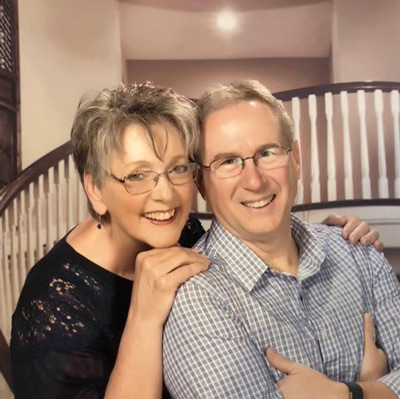Vicki Telhiard: As If It Never Happened
Around 2:30 a.m. one Monday morning in May 2021, Vicki Telhiard had a grand mal seizure with violent muscle contractions and temporary loss of consciousness. Her husband, Scott Telhiard, drove her to a community hospital near their home in Richmond, Texas, where a CT scan revealed a mass on the upper right side of her brain. She was transferred to Memorial Hermann Southwest Hospital and admitted to the Neuroscience ICU, a dedicated 36-bed specialty critical care unit. Krish Vigneswaran, MD, a fellowship-trained neurosurgeon at UTHealth Neurosciences with expertise in spine and brain tumor surgery, ordered an MRI and went over the results with the Telhiards later that morning.
“Dr. V said Vicki needed surgery and asked if we had pets or children to take care of at home. If not, she could stay in the Neuro ICU and they would take her to surgery the following day,” Scott Telhiard says. “We had no commitments, so she stayed.”
Vigneswaran told the couple the tumor had the appearance of a meningioma and was the likely trigger of the seizure. He stabilized her with Keppra, an anticonvulsant.
“The tumor covered an entire portion of the top of the right half of Vicki’s brain,” says Vigneswaran, a clinical assistant professor in the Vivian L. Smith Department of Neurosurgery at McGovern Medical School at UTHealth Houston. “We thought we could avoid the need for radiation after surgery if we could remove it in one piece.”
In a technically challenging operation, he used the hospital’s surgical navigation system to plan a hair-sparing incision and a high-tech surgical microscope to remove the meningioma. “Because the tumor was large and adherent to the brain, we put her on a high-dose anticonvulsant to avoid seizures following the removal,” Vigneswaran says.
After a week of recovery in the Neuro ICU, Telhiard’s medication was gradually reduced. She spent a few days in a step-down unit, and then was transferred to TIRR Memorial Hermann’s inpatient rehabilitation unit on the hospital’s eighth floor. Manisha Bawa, MD, an assistant professor of physical medicine and rehabilitation at McGovern Medical School, directs the unit and works exclusively with patients who require neurorehabilitation following spine or brain surgery.
In total, Telhiard was hospitalized for 22 days. “I had a very good experience with Dr. V,” she says. “Once they got my medicine to the point that my body could function, I was blazing a trail through my therapy, which went really, really well. I pushed hard to do everything they asked.”
Telhiard’s left side was impacted by the surgery. “Presurgery, she was fully functional,” her husband says. “While she was in the Neuro ICU, she started having contractions in her left leg and foot. Her speech was affected, and the left side of her face drooped. Dr. V was always positive about her potential for full recovery.”
Vigneswaran credits Telhiard’s rapid improvement to her self-confidence and the support of her husband and family. “The brain is stunned after removal of a large tumor, and we expect a postoperative course that’s rocky,” he says. “Once our patients are medically stable, we send them to rehab to maximize their recovery. We always recommend continuing with rehabilitation after discharge to address any small deficits.”
Telhiard continued rehabilitation for 2 ½ more months at TIRR Memorial Hermann Outpatient Rehabilitation-Sugar Land. In August she had a follow-up MRI and met with Vigneswaran to review the results. “The MRI was crystal clear,” Scott Telhiard says. “They removed all of the tumor, which was massive, and she didn’t need radiation. We were very happy.”
“Vicki always kept a positive attitude despite the difficulty of her treatment course,” Vigneswaran says. “She understood what was expected of her as a patient to maximize her rehab potential. Her husband was a strong positive influence. He stayed with her and kept her community engaged in her recovery process.”
“Everyone was astounded at my recovery,” she says. “Dr. V’s entire team was helpful and honest and said it will take time for you to heal 100%. If you get tired, take a nap. If there’s a problem, call us. They don’t just cut you loose. Dr. V was a font of information about how to speed the healing process. Today, it’s as if it never even happened.”












